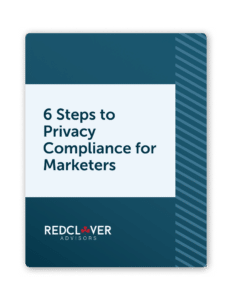The digital marketing landscape of 2025 looks vastly different from what it was even a few years ago. With comprehensive privacy laws now active across multiple U.S. states, strict AI regulations reshaping digital advertising globally, and tech giants finally being held accountable for data practices, privacy compliance has moved from a legal checkbox to a business imperative. Major changes in how companies like Meta and Google handle user data, combined with stricter enforcement of privacy regulations worldwide, have created a new reality for digital marketing.
If you’re running a marketing agency, you’ve probably noticed that “we’ll let the client handle privacy compliance” doesn’t cut it anymore. The gap between digital marketing practices and privacy compliance isn’t just growing – it’s becoming a liability.
Let’s dive into what marketing agencies need to know about privacy compliance in 2025, and why it’s now very much your problem too.
The New Reality of Consent Management
The days of telling clients ‘the privacy policy covers it’ are behind us. In 2025, agencies face a stark new reality: every campaign you launch, every pixel you place, and every tool you implement requires its own consent strategy. As the architects of your clients’ digital campaigns, you’re now responsible for mapping out every data collection touchpoint across multiple platforms, vendors, and jurisdictions. Each new campaign integration, social media pixel, or analytics tool you implement creates additional consent requirements. And with clients running concurrent campaigns across various channels, your agency needs robust systems to track and manage these intertwined consent obligations – because when privacy auditors come knocking, they’re looking at both your clients and their marketing partners.
Even more crucial is the need to understand that consent requirements vary by jurisdiction and data type. What’s acceptable in one state might not pass muster in another, and what works for basic analytics might not be sufficient for more invasive tracking methods. As an agency, you need to be prepared to navigate these complexities while still delivering effective marketing solutions for your clients.
What Agencies Need to Implement:
- Clear consent mechanisms that work across all marketing tools and platforms
- Comprehensive documentation of all data collection points
- Regular audits of consent processes
- Systems to refresh consent when required
- Proper storage of consent records
Key Changes for Agency Operations:
- Document every pixel placement and its purpose
- Maintain clear records of data processing activities
- Implement proper consent management before launching campaigns
- Regularly review and update consent mechanisms
- Create clear processes for consent withdrawal
The Pixel and Tracking Revolution
Here’s a common scenario: Your agency adds a new tracking pixel, the client gets excited about more data, but nobody asks the crucial questions. In 2025, this approach is a fast track to compliance issues.
The reality is that every pixel, tag, and tracking script you implement creates a new data flow that needs to be documented and managed. Marketing agencies often add these tools with the best intentions – better campaign tracking, improved ROI measurement, enhanced retargeting capabilities. However, each new implementation also creates potential privacy risks that need to be assessed and managed. The challenge isn’t just technical implementation; it’s understanding the downstream implications of each tracking decision.
Moreover, agencies need to shift from a “set it and forget it” mentality to an active management approach. Regular audits aren’t just good practice – they’re becoming a legal requirement. This means developing systems to regularly review tracking implementations, assess their necessity, and ensure they’re still compliant with evolving privacy regulations.
Essential Agency Protocols:
- Documented pixel approval processes
- Clear tracking implementation procedures
- Regular compliance checks of all tracking mechanisms
- Removal procedures for outdated or non-compliant tracking
- Understanding of state-specific requirements
Technical Requirements:
- Implementation of Global Privacy Control (GPC) signals
- Regular cookie audits (monthly, not annually)
- Functional opt-out mechanisms that actually work
- Clear documentation of all data flows
- Privacy-compliant alternatives to third-party cookies
The Agency-Client Privacy Partnership
The governance gap between agencies and clients is now a critical business risk. It’s time to establish clear lines of responsibility and accountability.
This isn’t just about protecting your agency – it’s about building stronger, more transparent relationships with your clients. Many agencies are discovering that privacy compliance can actually be a competitive advantage. By demonstrating expertise in privacy-compliant marketing strategies, you position your agency as a trusted partner rather than just a service provider. This shift in perspective often leads to longer-term client relationships and better project outcomes.
The key is developing a proactive approach to privacy governance. Instead of waiting for clients to raise privacy concerns, successful agencies are building privacy considerations into their standard operating procedures. This means creating clear documentation, establishing regular check-ins about privacy compliance, and maintaining open communication channels about data handling practices.
What Agencies Must Provide:
- Clear contracts defining privacy responsibilities
- Documented processes for all data collection activities
- Regular compliance reports
- Incident response plans
- Training programs for agency staff
Essential Agency Processes:
- Regular privacy impact assessments
- Documentation of all marketing technology implementations
- Clear procedures for handling personal data
- Robust data minimization practices
- Regular staff training on privacy requirements
Practical Implementation Steps
Your agency needs a systematic approach to privacy compliance. Here’s how to start.
The journey to privacy compliance isn’t a sprint – it’s a marathon that requires careful planning and consistent execution. Start by conducting a thorough audit of your current practices. This means reviewing every tool, pixel, and process you use across all client accounts. Don’t be surprised if you discover tracking elements that were implemented years ago and forgotten. This discovery phase is crucial for understanding the scope of work needed to achieve compliance.
From there, focus on building sustainable processes that can grow with your agency. The goal isn’t just to achieve compliance today but to maintain it as privacy requirements continue to evolve. This might mean investing in new tools, updating your project management processes, or even hiring dedicated privacy specialists. The key is creating systems that make privacy compliance a natural part of your agency’s workflow rather than an afterthought.
Immediate Actions:
- Audit all current tracking implementations
- Review and update client contracts
- Implement proper consent management
- Create documentation procedures
- Establish regular compliance checks
Ongoing Requirements:
- Monthly cookie audits
- Regular staff training
- Client compliance reporting
- Technology stack reviews
- Privacy impact assessments
Your Agency’s Privacy Compliance Checklist
Ready to transform your agency’s approach to privacy? Our comprehensive checklist covers everything you need to implement, including:
- Consent management frameworks
- Pixel approval processes
- Data flow documentation templates
- Client contract guidelines
- Compliance monitoring procedures
- Staff training materials
- Incident response protocols
6 Steps to Privacy Compliance for Marketers
Download our 6 Steps to Privacy Compliance for Marketers to navigate regulations, manage data, and build consumer trust.

Remember: Privacy compliance isn’t just about protecting your clients – it’s about protecting your agency’s future. Don’t wait until a client faces a privacy issue to start taking this seriously.


